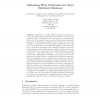Free Online Productivity Tools
i2Speak
i2Symbol
i2OCR
iTex2Img
iWeb2Print
iWeb2Shot
i2Type
iPdf2Split
iPdf2Merge
i2Bopomofo
i2Arabic
i2Style
i2Image
i2PDF
iLatex2Rtf
Sci2ools
108
click to vote
DASFAA
2010
IEEE
2010
IEEE
Optimizing Write Performance for Read Optimized Databases
Compression in column-oriented databases has been proven to offer both performance enhancements and reductions in storage consumption. This is especially true for read access as compressed data can directly be processed for query execution.Nevertheless, compression happens to be disadvantageous when it comes to write access due to unavoidable re-compression: write-access requires significantly more data to be read than involved in the particular operation, more tuples may have to be modified depending on the compression algorithm, and tablelevel locks have to be acquired instead of row-level locks as long as no second version of the data is stored. As an effect the duration of a single modification — both insert and update — limits both throughput and response time significantly. In this paper, we propose to use an additional write-optimized buffer to maintain the delta that in conjunction with the compressed main store represents the current state of the data. This buffer ...
Column-oriented Data Structure | Column-oriented Databases | DASFAA 2010 | Database | Unavoidable Re-compression |
Related Content
| Added | 17 May 2010 |
| Updated | 17 May 2010 |
| Type | Conference |
| Year | 2010 |
| Where | DASFAA |
| Authors | Jens Krüger, Martin Grund, Christian Tinnefeld, Hasso Plattner, Alexander Zeier, Franz Faerber |
Comments (0)

